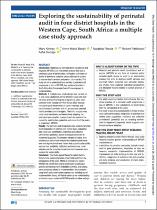| dc.description.abstract | Introduction Maternal and perinatal death surveillance and response (MPDSR) is an intervention process that uses a continuous cycle of identification, notification and review of deaths to determine avoidable causes followed by actions to improve health services and prevent future deaths. This study set out to understand how and why a perinatal audit programme, a form of MPDSR, has sustained practice in South Africa from the perspectives of those engaged in implementation.
Methods A multiple case study design was carried out in four rural subdistricts of the Western Cape with over 10 years of implementing the programme. Data were collected from October 2019 to March 2020 through non-participant observation of seven meetings and key informant interviews with 41 purposively selected health providers and managers. Thematic analysis was conducted inductively and deductively adapting the extended normalisation process theory to examine the capability, contribution, potential and capacity of the users to implement MPDSR.
Results The perinatal audit programme has sustained practice due to integration of activities into routine tasks (capability), clear value-add (contribution), individual and collective commitment (potential), and an enabling environment to implement (capacity). The complex interplay of actors, their relationships and context revealed the underlying individual-level and organisational-level factors that support sustainability, such as trust, credibility, facilitation and hierarchies. Local adaption and the broad social and structural resources were required for sustainability.
Conclusion This study applied theory to explore factors that promote sustained practice of perinatal audit from the perspectives of the users. Efforts to promote and sustain MPDSR will benefit from overall good health governance, specific skill development, embedded activities, and valuing social processes related to implementation. More research using health policy and system approaches, including use of implementation theory, will further advance our understanding on how to support sustained MPDSR practice in other settings. | en_US |

